University Report: Exploring Learning Through Play in Early Childhood
VerifiedAdded on 2023/04/19
|18
|4689
|417
Report
AI Summary
This report delves into the significance of learning through play in early childhood education. It begins by exploring the importance of play, its impact on cognitive, emotional, social, and physical development. The report then examines theoretical implications, including the social perspective of playing based on the works of George Herbert Mead and the psychological aspects as characterized by Jean Piaget. It highlights the benefits of play, such as fostering physical development and affecting emotional and cognitive growth. Furthermore, the report includes interviews with two early school educators, offering diverse perspectives on the role of play in child development and identity formation. The educators discuss their perceptions, the ways in which play helps children, and the strategies they recommend. The report concludes by emphasizing the critical impact of play on a child's overall development, underscoring its role in shaping future personalities, social interactions, and the development of well-being and identity.

Running head: LEARNING THROUGH PLAY
Learning through Play
Name of the student
Name of the university
Authors note
Learning through Play
Name of the student
Name of the university
Authors note
Paraphrase This Document
Need a fresh take? Get an instant paraphrase of this document with our AI Paraphraser
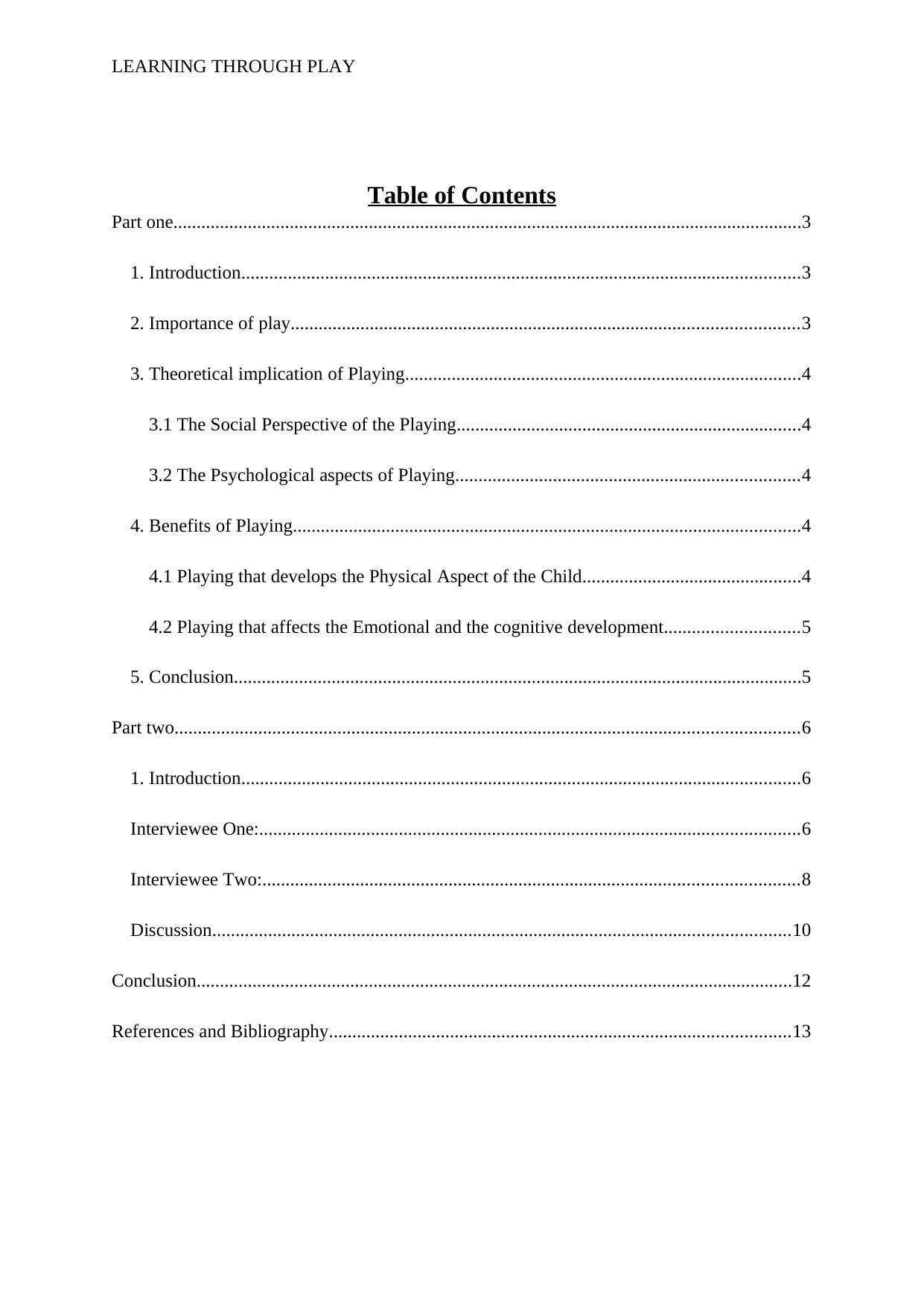
LEARNING THROUGH PLAY
Table of Contents
Part one.......................................................................................................................................3
1. Introduction........................................................................................................................3
2. Importance of play.............................................................................................................3
3. Theoretical implication of Playing.....................................................................................4
3.1 The Social Perspective of the Playing..........................................................................4
3.2 The Psychological aspects of Playing..........................................................................4
4. Benefits of Playing.............................................................................................................4
4.1 Playing that develops the Physical Aspect of the Child...............................................4
4.2 Playing that affects the Emotional and the cognitive development.............................5
5. Conclusion..........................................................................................................................5
Part two......................................................................................................................................6
1. Introduction........................................................................................................................6
Interviewee One:....................................................................................................................6
Interviewee Two:...................................................................................................................8
Discussion............................................................................................................................10
Conclusion................................................................................................................................12
References and Bibliography...................................................................................................13
Table of Contents
Part one.......................................................................................................................................3
1. Introduction........................................................................................................................3
2. Importance of play.............................................................................................................3
3. Theoretical implication of Playing.....................................................................................4
3.1 The Social Perspective of the Playing..........................................................................4
3.2 The Psychological aspects of Playing..........................................................................4
4. Benefits of Playing.............................................................................................................4
4.1 Playing that develops the Physical Aspect of the Child...............................................4
4.2 Playing that affects the Emotional and the cognitive development.............................5
5. Conclusion..........................................................................................................................5
Part two......................................................................................................................................6
1. Introduction........................................................................................................................6
Interviewee One:....................................................................................................................6
Interviewee Two:...................................................................................................................8
Discussion............................................................................................................................10
Conclusion................................................................................................................................12
References and Bibliography...................................................................................................13
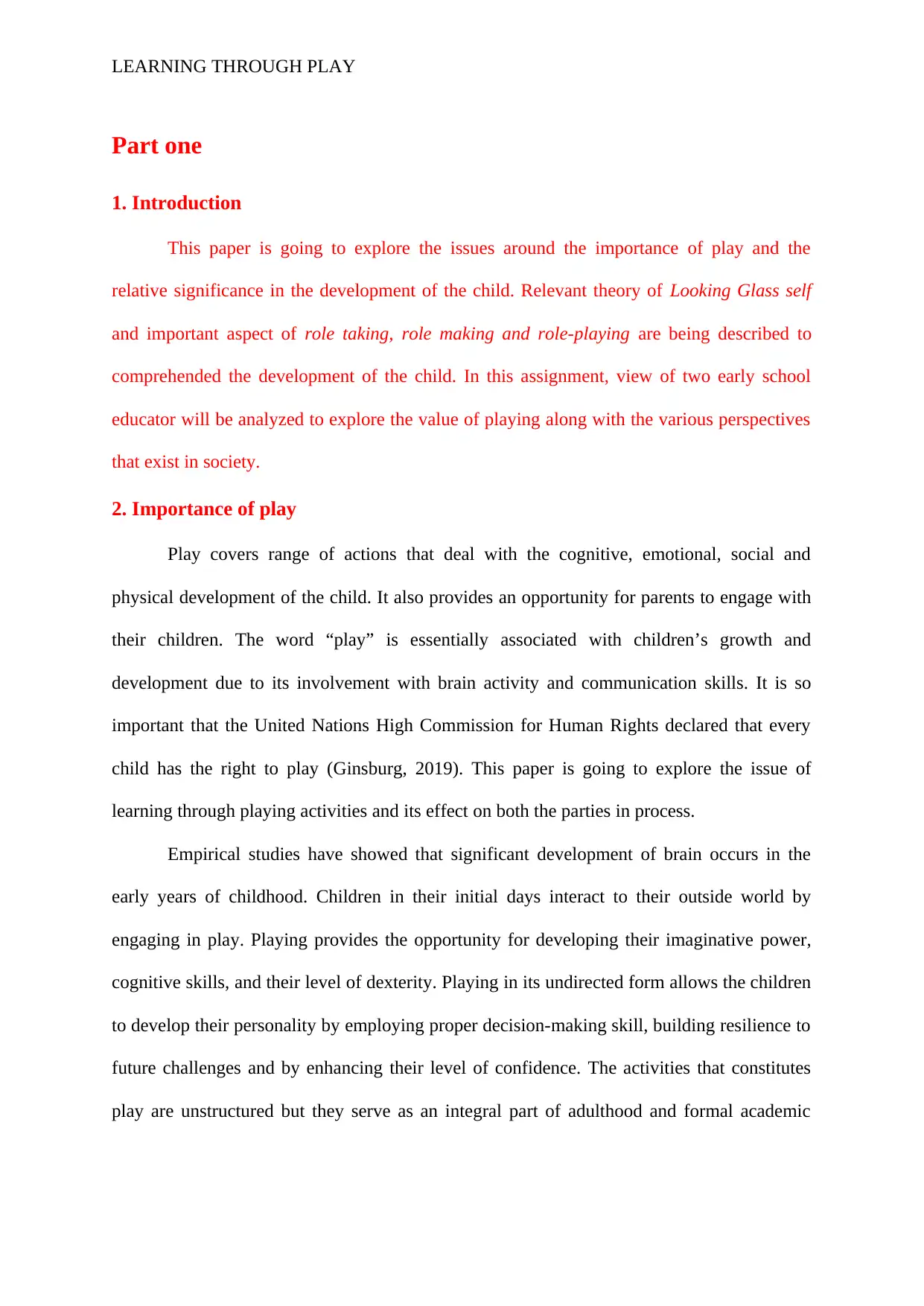
LEARNING THROUGH PLAY
Part one
1. Introduction
This paper is going to explore the issues around the importance of play and the
relative significance in the development of the child. Relevant theory of Looking Glass self
and important aspect of role taking, role making and role-playing are being described to
comprehended the development of the child. In this assignment, view of two early school
educator will be analyzed to explore the value of playing along with the various perspectives
that exist in society.
2. Importance of play
Play covers range of actions that deal with the cognitive, emotional, social and
physical development of the child. It also provides an opportunity for parents to engage with
their children. The word “play” is essentially associated with children’s growth and
development due to its involvement with brain activity and communication skills. It is so
important that the United Nations High Commission for Human Rights declared that every
child has the right to play (Ginsburg, 2019). This paper is going to explore the issue of
learning through playing activities and its effect on both the parties in process.
Empirical studies have showed that significant development of brain occurs in the
early years of childhood. Children in their initial days interact to their outside world by
engaging in play. Playing provides the opportunity for developing their imaginative power,
cognitive skills, and their level of dexterity. Playing in its undirected form allows the children
to develop their personality by employing proper decision-making skill, building resilience to
future challenges and by enhancing their level of confidence. The activities that constitutes
play are unstructured but they serve as an integral part of adulthood and formal academic
Part one
1. Introduction
This paper is going to explore the issues around the importance of play and the
relative significance in the development of the child. Relevant theory of Looking Glass self
and important aspect of role taking, role making and role-playing are being described to
comprehended the development of the child. In this assignment, view of two early school
educator will be analyzed to explore the value of playing along with the various perspectives
that exist in society.
2. Importance of play
Play covers range of actions that deal with the cognitive, emotional, social and
physical development of the child. It also provides an opportunity for parents to engage with
their children. The word “play” is essentially associated with children’s growth and
development due to its involvement with brain activity and communication skills. It is so
important that the United Nations High Commission for Human Rights declared that every
child has the right to play (Ginsburg, 2019). This paper is going to explore the issue of
learning through playing activities and its effect on both the parties in process.
Empirical studies have showed that significant development of brain occurs in the
early years of childhood. Children in their initial days interact to their outside world by
engaging in play. Playing provides the opportunity for developing their imaginative power,
cognitive skills, and their level of dexterity. Playing in its undirected form allows the children
to develop their personality by employing proper decision-making skill, building resilience to
future challenges and by enhancing their level of confidence. The activities that constitutes
play are unstructured but they serve as an integral part of adulthood and formal academic
⊘ This is a preview!⊘
Do you want full access?
Subscribe today to unlock all pages.

Trusted by 1+ million students worldwide
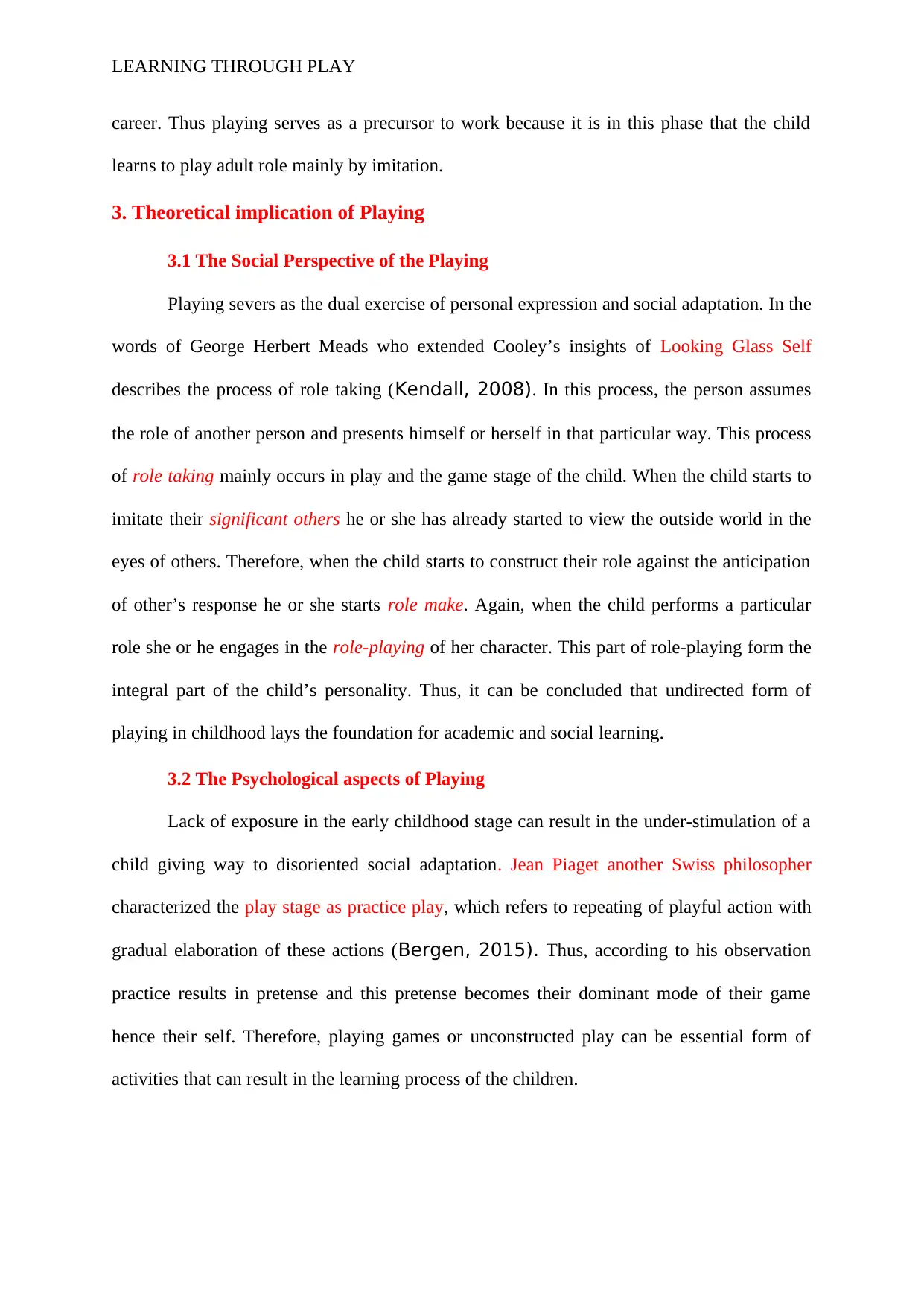
LEARNING THROUGH PLAY
career. Thus playing serves as a precursor to work because it is in this phase that the child
learns to play adult role mainly by imitation.
3. Theoretical implication of Playing
3.1 The Social Perspective of the Playing
Playing severs as the dual exercise of personal expression and social adaptation. In the
words of George Herbert Meads who extended Cooley’s insights of Looking Glass Self
describes the process of role taking (Kendall, 2008). In this process, the person assumes
the role of another person and presents himself or herself in that particular way. This process
of role taking mainly occurs in play and the game stage of the child. When the child starts to
imitate their significant others he or she has already started to view the outside world in the
eyes of others. Therefore, when the child starts to construct their role against the anticipation
of other’s response he or she starts role make. Again, when the child performs a particular
role she or he engages in the role-playing of her character. This part of role-playing form the
integral part of the child’s personality. Thus, it can be concluded that undirected form of
playing in childhood lays the foundation for academic and social learning.
3.2 The Psychological aspects of Playing
Lack of exposure in the early childhood stage can result in the under-stimulation of a
child giving way to disoriented social adaptation. Jean Piaget another Swiss philosopher
characterized the play stage as practice play, which refers to repeating of playful action with
gradual elaboration of these actions (Bergen, 2015). Thus, according to his observation
practice results in pretense and this pretense becomes their dominant mode of their game
hence their self. Therefore, playing games or unconstructed play can be essential form of
activities that can result in the learning process of the children.
career. Thus playing serves as a precursor to work because it is in this phase that the child
learns to play adult role mainly by imitation.
3. Theoretical implication of Playing
3.1 The Social Perspective of the Playing
Playing severs as the dual exercise of personal expression and social adaptation. In the
words of George Herbert Meads who extended Cooley’s insights of Looking Glass Self
describes the process of role taking (Kendall, 2008). In this process, the person assumes
the role of another person and presents himself or herself in that particular way. This process
of role taking mainly occurs in play and the game stage of the child. When the child starts to
imitate their significant others he or she has already started to view the outside world in the
eyes of others. Therefore, when the child starts to construct their role against the anticipation
of other’s response he or she starts role make. Again, when the child performs a particular
role she or he engages in the role-playing of her character. This part of role-playing form the
integral part of the child’s personality. Thus, it can be concluded that undirected form of
playing in childhood lays the foundation for academic and social learning.
3.2 The Psychological aspects of Playing
Lack of exposure in the early childhood stage can result in the under-stimulation of a
child giving way to disoriented social adaptation. Jean Piaget another Swiss philosopher
characterized the play stage as practice play, which refers to repeating of playful action with
gradual elaboration of these actions (Bergen, 2015). Thus, according to his observation
practice results in pretense and this pretense becomes their dominant mode of their game
hence their self. Therefore, playing games or unconstructed play can be essential form of
activities that can result in the learning process of the children.
Paraphrase This Document
Need a fresh take? Get an instant paraphrase of this document with our AI Paraphraser
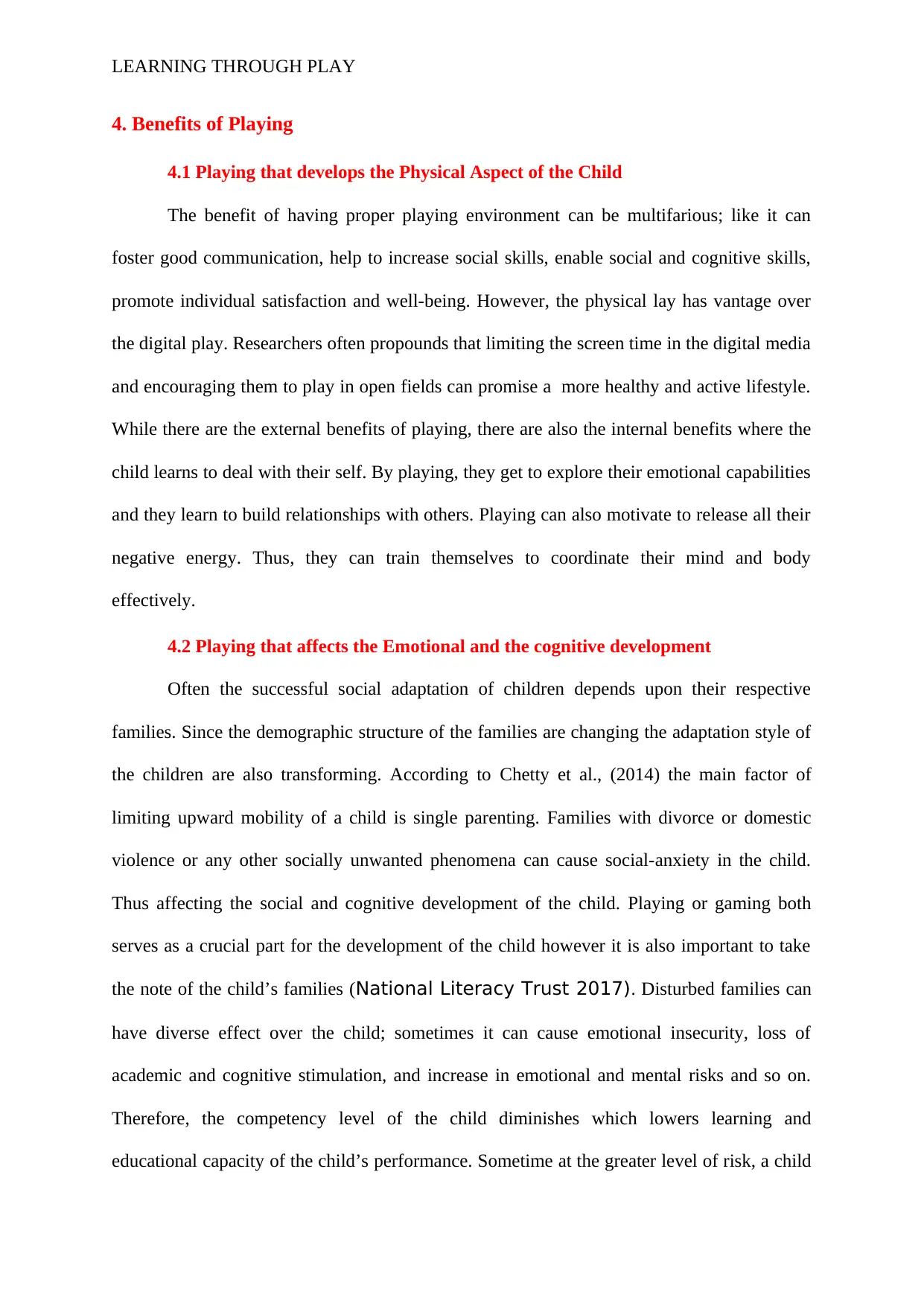
LEARNING THROUGH PLAY
4. Benefits of Playing
4.1 Playing that develops the Physical Aspect of the Child
The benefit of having proper playing environment can be multifarious; like it can
foster good communication, help to increase social skills, enable social and cognitive skills,
promote individual satisfaction and well-being. However, the physical lay has vantage over
the digital play. Researchers often propounds that limiting the screen time in the digital media
and encouraging them to play in open fields can promise a more healthy and active lifestyle.
While there are the external benefits of playing, there are also the internal benefits where the
child learns to deal with their self. By playing, they get to explore their emotional capabilities
and they learn to build relationships with others. Playing can also motivate to release all their
negative energy. Thus, they can train themselves to coordinate their mind and body
effectively.
4.2 Playing that affects the Emotional and the cognitive development
Often the successful social adaptation of children depends upon their respective
families. Since the demographic structure of the families are changing the adaptation style of
the children are also transforming. According to Chetty et al., (2014) the main factor of
limiting upward mobility of a child is single parenting. Families with divorce or domestic
violence or any other socially unwanted phenomena can cause social-anxiety in the child.
Thus affecting the social and cognitive development of the child. Playing or gaming both
serves as a crucial part for the development of the child however it is also important to take
the note of the child’s families (National Literacy Trust 2017). Disturbed families can
have diverse effect over the child; sometimes it can cause emotional insecurity, loss of
academic and cognitive stimulation, and increase in emotional and mental risks and so on.
Therefore, the competency level of the child diminishes which lowers learning and
educational capacity of the child’s performance. Sometime at the greater level of risk, a child
4. Benefits of Playing
4.1 Playing that develops the Physical Aspect of the Child
The benefit of having proper playing environment can be multifarious; like it can
foster good communication, help to increase social skills, enable social and cognitive skills,
promote individual satisfaction and well-being. However, the physical lay has vantage over
the digital play. Researchers often propounds that limiting the screen time in the digital media
and encouraging them to play in open fields can promise a more healthy and active lifestyle.
While there are the external benefits of playing, there are also the internal benefits where the
child learns to deal with their self. By playing, they get to explore their emotional capabilities
and they learn to build relationships with others. Playing can also motivate to release all their
negative energy. Thus, they can train themselves to coordinate their mind and body
effectively.
4.2 Playing that affects the Emotional and the cognitive development
Often the successful social adaptation of children depends upon their respective
families. Since the demographic structure of the families are changing the adaptation style of
the children are also transforming. According to Chetty et al., (2014) the main factor of
limiting upward mobility of a child is single parenting. Families with divorce or domestic
violence or any other socially unwanted phenomena can cause social-anxiety in the child.
Thus affecting the social and cognitive development of the child. Playing or gaming both
serves as a crucial part for the development of the child however it is also important to take
the note of the child’s families (National Literacy Trust 2017). Disturbed families can
have diverse effect over the child; sometimes it can cause emotional insecurity, loss of
academic and cognitive stimulation, and increase in emotional and mental risks and so on.
Therefore, the competency level of the child diminishes which lowers learning and
educational capacity of the child’s performance. Sometime at the greater level of risk, a child
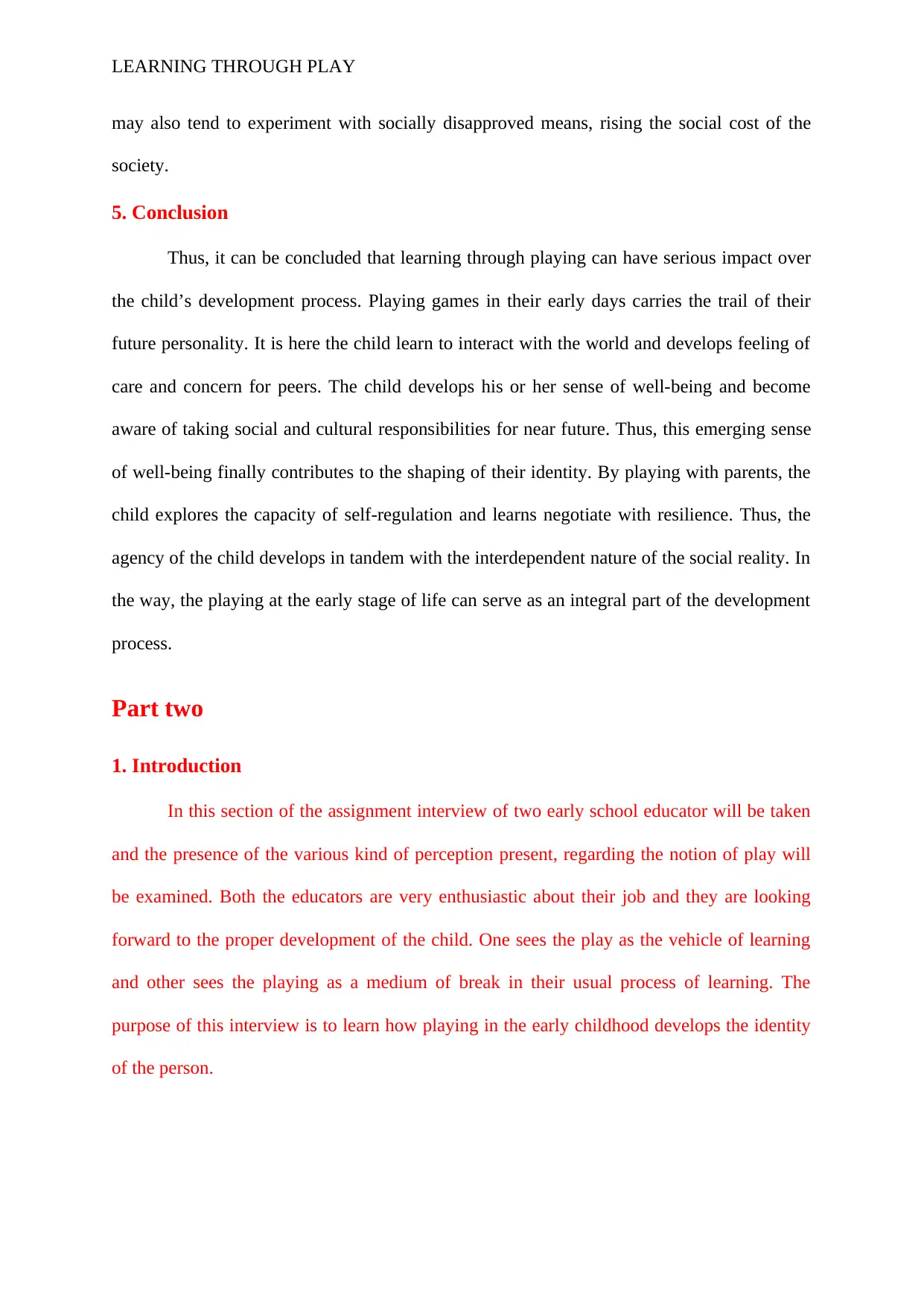
LEARNING THROUGH PLAY
may also tend to experiment with socially disapproved means, rising the social cost of the
society.
5. Conclusion
Thus, it can be concluded that learning through playing can have serious impact over
the child’s development process. Playing games in their early days carries the trail of their
future personality. It is here the child learn to interact with the world and develops feeling of
care and concern for peers. The child develops his or her sense of well-being and become
aware of taking social and cultural responsibilities for near future. Thus, this emerging sense
of well-being finally contributes to the shaping of their identity. By playing with parents, the
child explores the capacity of self-regulation and learns negotiate with resilience. Thus, the
agency of the child develops in tandem with the interdependent nature of the social reality. In
the way, the playing at the early stage of life can serve as an integral part of the development
process.
Part two
1. Introduction
In this section of the assignment interview of two early school educator will be taken
and the presence of the various kind of perception present, regarding the notion of play will
be examined. Both the educators are very enthusiastic about their job and they are looking
forward to the proper development of the child. One sees the play as the vehicle of learning
and other sees the playing as a medium of break in their usual process of learning. The
purpose of this interview is to learn how playing in the early childhood develops the identity
of the person.
may also tend to experiment with socially disapproved means, rising the social cost of the
society.
5. Conclusion
Thus, it can be concluded that learning through playing can have serious impact over
the child’s development process. Playing games in their early days carries the trail of their
future personality. It is here the child learn to interact with the world and develops feeling of
care and concern for peers. The child develops his or her sense of well-being and become
aware of taking social and cultural responsibilities for near future. Thus, this emerging sense
of well-being finally contributes to the shaping of their identity. By playing with parents, the
child explores the capacity of self-regulation and learns negotiate with resilience. Thus, the
agency of the child develops in tandem with the interdependent nature of the social reality. In
the way, the playing at the early stage of life can serve as an integral part of the development
process.
Part two
1. Introduction
In this section of the assignment interview of two early school educator will be taken
and the presence of the various kind of perception present, regarding the notion of play will
be examined. Both the educators are very enthusiastic about their job and they are looking
forward to the proper development of the child. One sees the play as the vehicle of learning
and other sees the playing as a medium of break in their usual process of learning. The
purpose of this interview is to learn how playing in the early childhood develops the identity
of the person.
⊘ This is a preview!⊘
Do you want full access?
Subscribe today to unlock all pages.

Trusted by 1+ million students worldwide
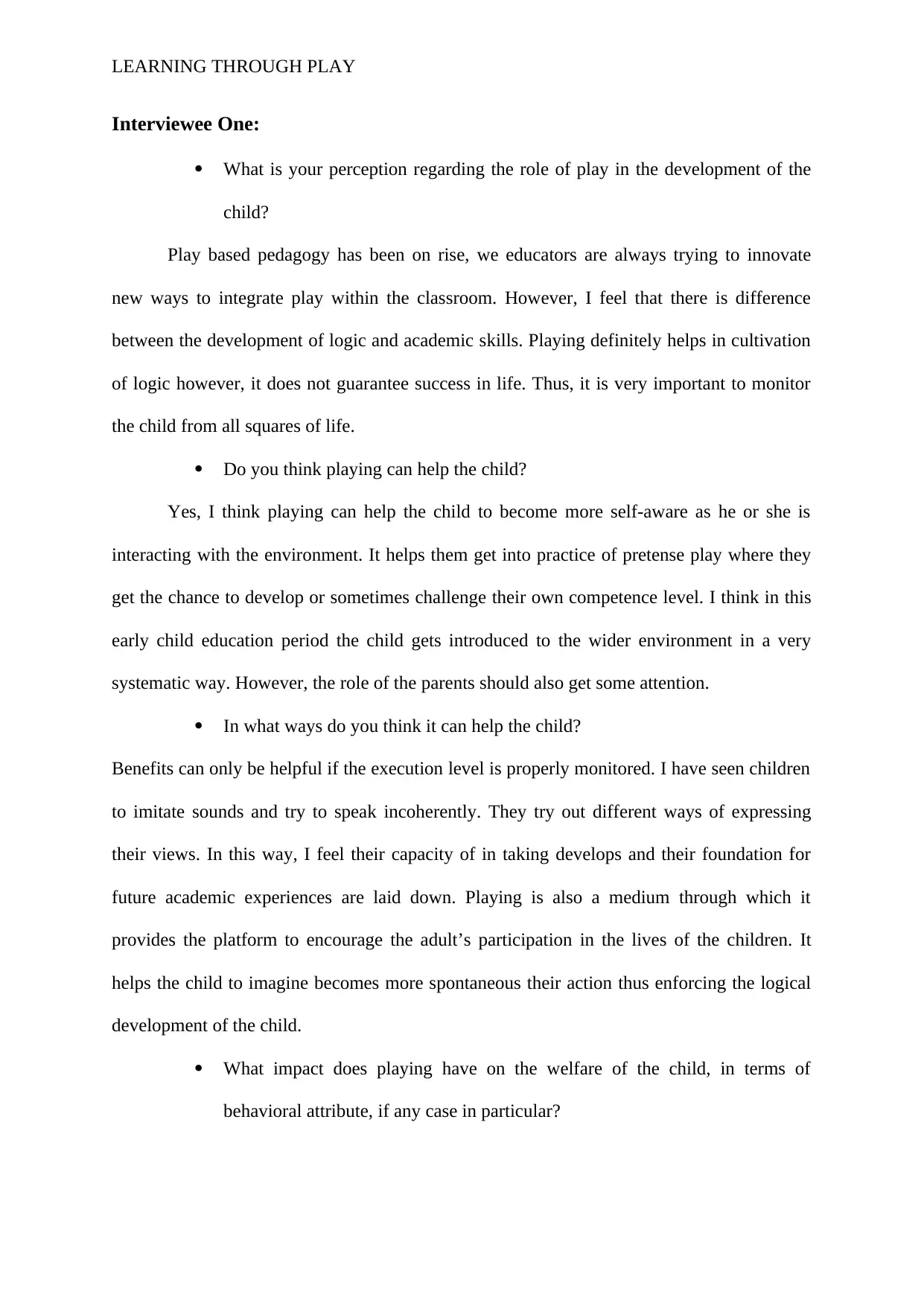
LEARNING THROUGH PLAY
Interviewee One:
What is your perception regarding the role of play in the development of the
child?
Play based pedagogy has been on rise, we educators are always trying to innovate
new ways to integrate play within the classroom. However, I feel that there is difference
between the development of logic and academic skills. Playing definitely helps in cultivation
of logic however, it does not guarantee success in life. Thus, it is very important to monitor
the child from all squares of life.
Do you think playing can help the child?
Yes, I think playing can help the child to become more self-aware as he or she is
interacting with the environment. It helps them get into practice of pretense play where they
get the chance to develop or sometimes challenge their own competence level. I think in this
early child education period the child gets introduced to the wider environment in a very
systematic way. However, the role of the parents should also get some attention.
In what ways do you think it can help the child?
Benefits can only be helpful if the execution level is properly monitored. I have seen children
to imitate sounds and try to speak incoherently. They try out different ways of expressing
their views. In this way, I feel their capacity of in taking develops and their foundation for
future academic experiences are laid down. Playing is also a medium through which it
provides the platform to encourage the adult’s participation in the lives of the children. It
helps the child to imagine becomes more spontaneous their action thus enforcing the logical
development of the child.
What impact does playing have on the welfare of the child, in terms of
behavioral attribute, if any case in particular?
Interviewee One:
What is your perception regarding the role of play in the development of the
child?
Play based pedagogy has been on rise, we educators are always trying to innovate
new ways to integrate play within the classroom. However, I feel that there is difference
between the development of logic and academic skills. Playing definitely helps in cultivation
of logic however, it does not guarantee success in life. Thus, it is very important to monitor
the child from all squares of life.
Do you think playing can help the child?
Yes, I think playing can help the child to become more self-aware as he or she is
interacting with the environment. It helps them get into practice of pretense play where they
get the chance to develop or sometimes challenge their own competence level. I think in this
early child education period the child gets introduced to the wider environment in a very
systematic way. However, the role of the parents should also get some attention.
In what ways do you think it can help the child?
Benefits can only be helpful if the execution level is properly monitored. I have seen children
to imitate sounds and try to speak incoherently. They try out different ways of expressing
their views. In this way, I feel their capacity of in taking develops and their foundation for
future academic experiences are laid down. Playing is also a medium through which it
provides the platform to encourage the adult’s participation in the lives of the children. It
helps the child to imagine becomes more spontaneous their action thus enforcing the logical
development of the child.
What impact does playing have on the welfare of the child, in terms of
behavioral attribute, if any case in particular?
Paraphrase This Document
Need a fresh take? Get an instant paraphrase of this document with our AI Paraphraser
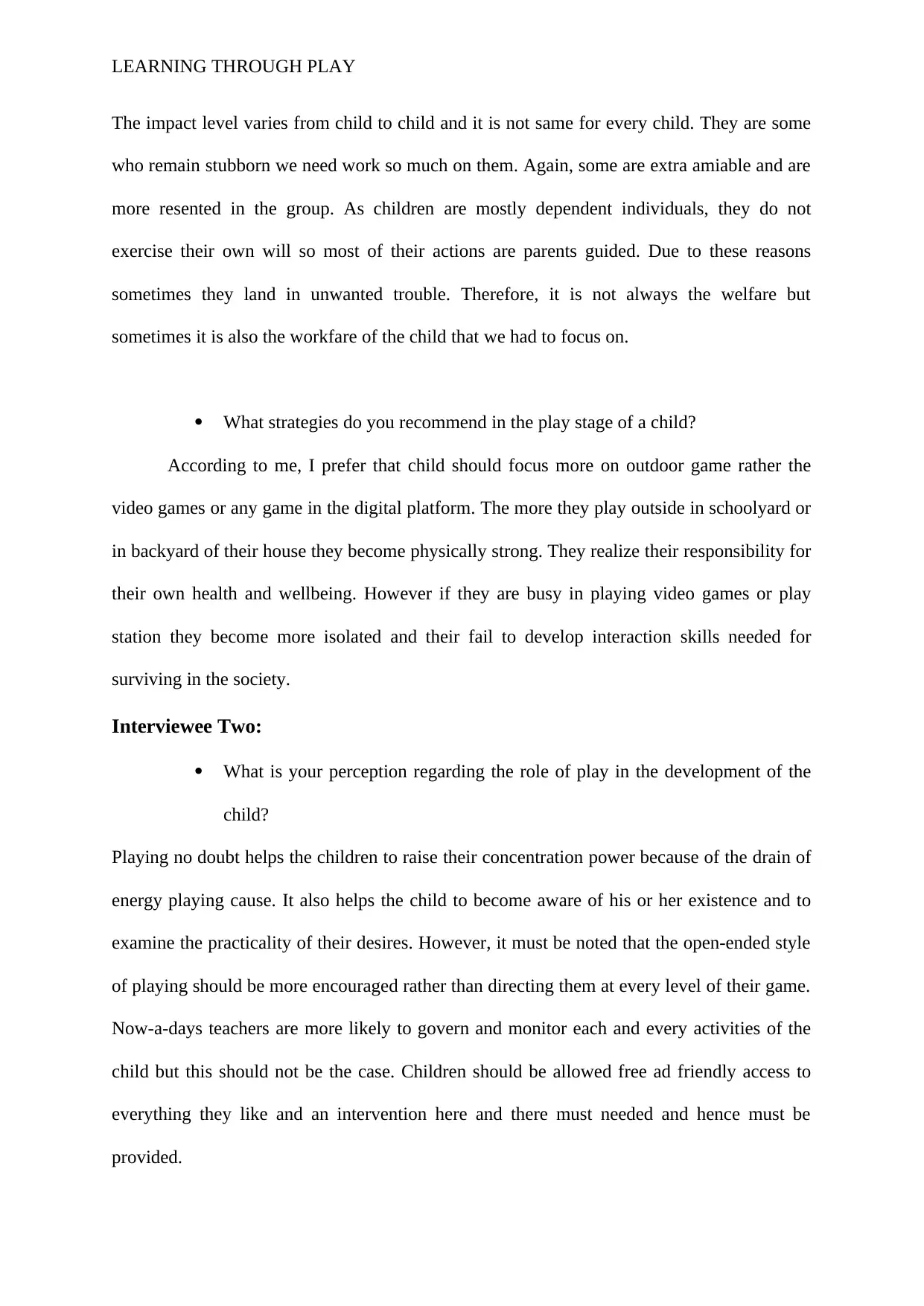
LEARNING THROUGH PLAY
The impact level varies from child to child and it is not same for every child. They are some
who remain stubborn we need work so much on them. Again, some are extra amiable and are
more resented in the group. As children are mostly dependent individuals, they do not
exercise their own will so most of their actions are parents guided. Due to these reasons
sometimes they land in unwanted trouble. Therefore, it is not always the welfare but
sometimes it is also the workfare of the child that we had to focus on.
What strategies do you recommend in the play stage of a child?
According to me, I prefer that child should focus more on outdoor game rather the
video games or any game in the digital platform. The more they play outside in schoolyard or
in backyard of their house they become physically strong. They realize their responsibility for
their own health and wellbeing. However if they are busy in playing video games or play
station they become more isolated and their fail to develop interaction skills needed for
surviving in the society.
Interviewee Two:
What is your perception regarding the role of play in the development of the
child?
Playing no doubt helps the children to raise their concentration power because of the drain of
energy playing cause. It also helps the child to become aware of his or her existence and to
examine the practicality of their desires. However, it must be noted that the open-ended style
of playing should be more encouraged rather than directing them at every level of their game.
Now-a-days teachers are more likely to govern and monitor each and every activities of the
child but this should not be the case. Children should be allowed free ad friendly access to
everything they like and an intervention here and there must needed and hence must be
provided.
The impact level varies from child to child and it is not same for every child. They are some
who remain stubborn we need work so much on them. Again, some are extra amiable and are
more resented in the group. As children are mostly dependent individuals, they do not
exercise their own will so most of their actions are parents guided. Due to these reasons
sometimes they land in unwanted trouble. Therefore, it is not always the welfare but
sometimes it is also the workfare of the child that we had to focus on.
What strategies do you recommend in the play stage of a child?
According to me, I prefer that child should focus more on outdoor game rather the
video games or any game in the digital platform. The more they play outside in schoolyard or
in backyard of their house they become physically strong. They realize their responsibility for
their own health and wellbeing. However if they are busy in playing video games or play
station they become more isolated and their fail to develop interaction skills needed for
surviving in the society.
Interviewee Two:
What is your perception regarding the role of play in the development of the
child?
Playing no doubt helps the children to raise their concentration power because of the drain of
energy playing cause. It also helps the child to become aware of his or her existence and to
examine the practicality of their desires. However, it must be noted that the open-ended style
of playing should be more encouraged rather than directing them at every level of their game.
Now-a-days teachers are more likely to govern and monitor each and every activities of the
child but this should not be the case. Children should be allowed free ad friendly access to
everything they like and an intervention here and there must needed and hence must be
provided.
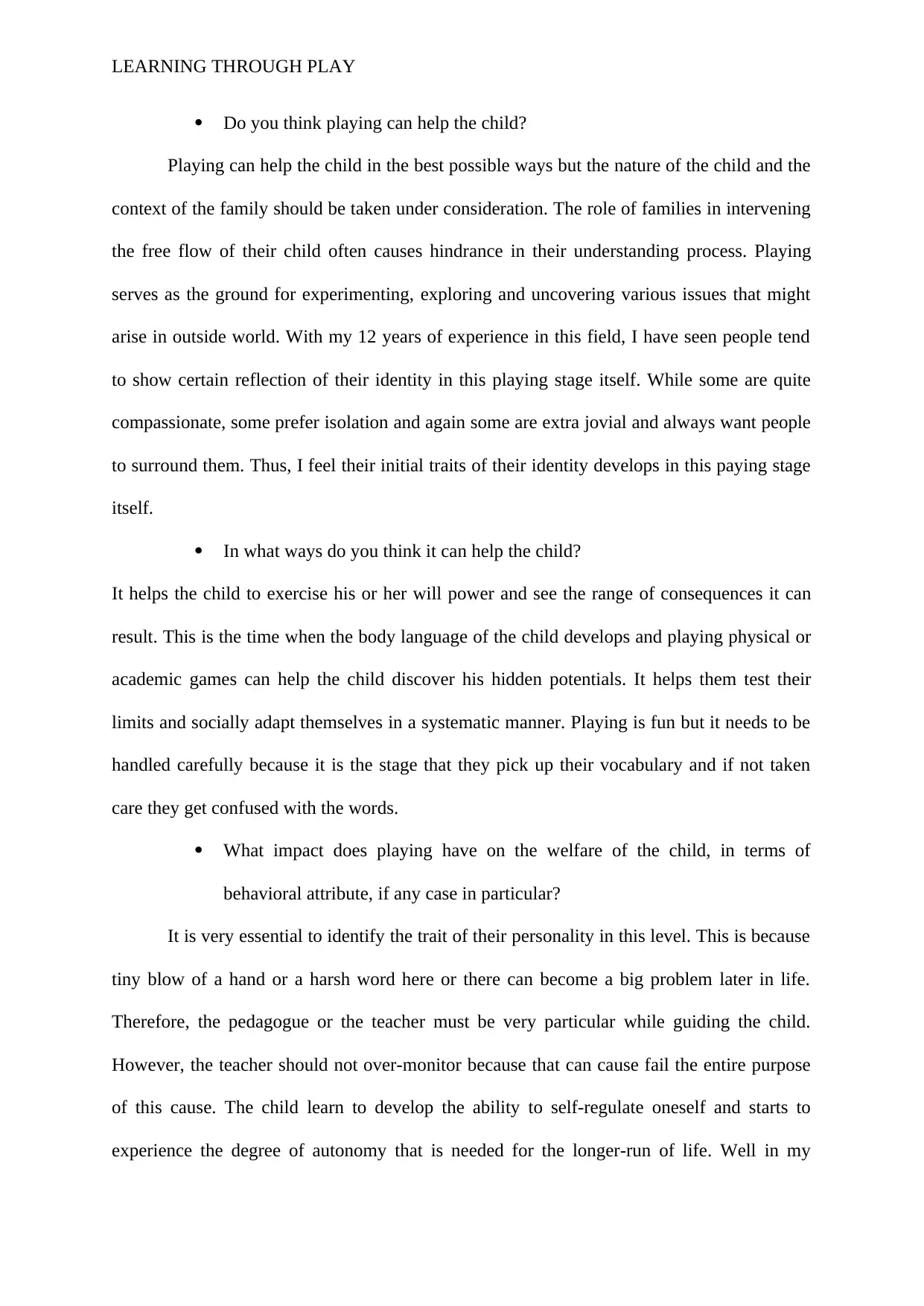
LEARNING THROUGH PLAY
Do you think playing can help the child?
Playing can help the child in the best possible ways but the nature of the child and the
context of the family should be taken under consideration. The role of families in intervening
the free flow of their child often causes hindrance in their understanding process. Playing
serves as the ground for experimenting, exploring and uncovering various issues that might
arise in outside world. With my 12 years of experience in this field, I have seen people tend
to show certain reflection of their identity in this playing stage itself. While some are quite
compassionate, some prefer isolation and again some are extra jovial and always want people
to surround them. Thus, I feel their initial traits of their identity develops in this paying stage
itself.
In what ways do you think it can help the child?
It helps the child to exercise his or her will power and see the range of consequences it can
result. This is the time when the body language of the child develops and playing physical or
academic games can help the child discover his hidden potentials. It helps them test their
limits and socially adapt themselves in a systematic manner. Playing is fun but it needs to be
handled carefully because it is the stage that they pick up their vocabulary and if not taken
care they get confused with the words.
What impact does playing have on the welfare of the child, in terms of
behavioral attribute, if any case in particular?
It is very essential to identify the trait of their personality in this level. This is because
tiny blow of a hand or a harsh word here or there can become a big problem later in life.
Therefore, the pedagogue or the teacher must be very particular while guiding the child.
However, the teacher should not over-monitor because that can cause fail the entire purpose
of this cause. The child learn to develop the ability to self-regulate oneself and starts to
experience the degree of autonomy that is needed for the longer-run of life. Well in my
Do you think playing can help the child?
Playing can help the child in the best possible ways but the nature of the child and the
context of the family should be taken under consideration. The role of families in intervening
the free flow of their child often causes hindrance in their understanding process. Playing
serves as the ground for experimenting, exploring and uncovering various issues that might
arise in outside world. With my 12 years of experience in this field, I have seen people tend
to show certain reflection of their identity in this playing stage itself. While some are quite
compassionate, some prefer isolation and again some are extra jovial and always want people
to surround them. Thus, I feel their initial traits of their identity develops in this paying stage
itself.
In what ways do you think it can help the child?
It helps the child to exercise his or her will power and see the range of consequences it can
result. This is the time when the body language of the child develops and playing physical or
academic games can help the child discover his hidden potentials. It helps them test their
limits and socially adapt themselves in a systematic manner. Playing is fun but it needs to be
handled carefully because it is the stage that they pick up their vocabulary and if not taken
care they get confused with the words.
What impact does playing have on the welfare of the child, in terms of
behavioral attribute, if any case in particular?
It is very essential to identify the trait of their personality in this level. This is because
tiny blow of a hand or a harsh word here or there can become a big problem later in life.
Therefore, the pedagogue or the teacher must be very particular while guiding the child.
However, the teacher should not over-monitor because that can cause fail the entire purpose
of this cause. The child learn to develop the ability to self-regulate oneself and starts to
experience the degree of autonomy that is needed for the longer-run of life. Well in my
⊘ This is a preview!⊘
Do you want full access?
Subscribe today to unlock all pages.

Trusted by 1+ million students worldwide
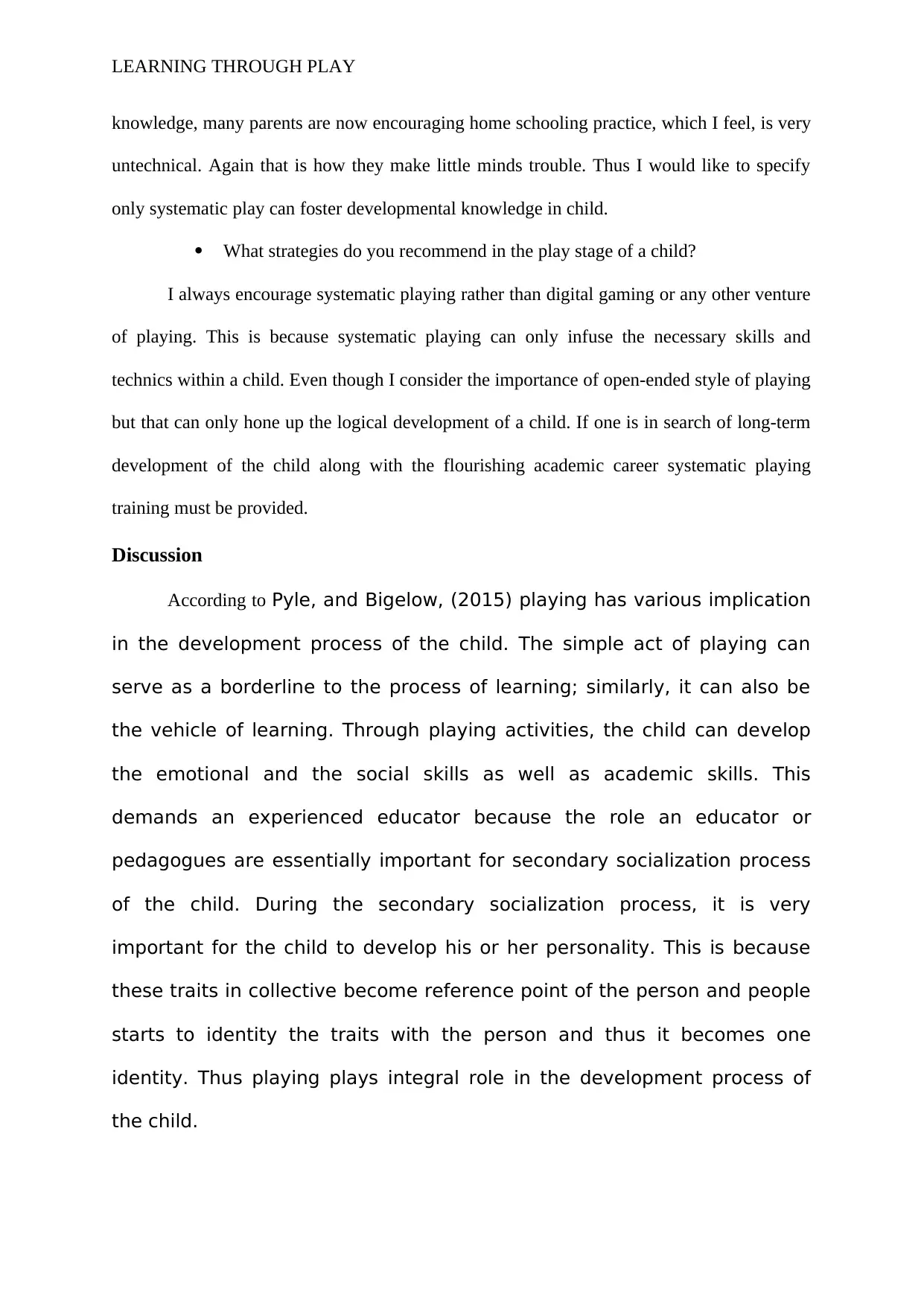
LEARNING THROUGH PLAY
knowledge, many parents are now encouraging home schooling practice, which I feel, is very
untechnical. Again that is how they make little minds trouble. Thus I would like to specify
only systematic play can foster developmental knowledge in child.
What strategies do you recommend in the play stage of a child?
I always encourage systematic playing rather than digital gaming or any other venture
of playing. This is because systematic playing can only infuse the necessary skills and
technics within a child. Even though I consider the importance of open-ended style of playing
but that can only hone up the logical development of a child. If one is in search of long-term
development of the child along with the flourishing academic career systematic playing
training must be provided.
Discussion
According to Pyle, and Bigelow, (2015) playing has various implication
in the development process of the child. The simple act of playing can
serve as a borderline to the process of learning; similarly, it can also be
the vehicle of learning. Through playing activities, the child can develop
the emotional and the social skills as well as academic skills. This
demands an experienced educator because the role an educator or
pedagogues are essentially important for secondary socialization process
of the child. During the secondary socialization process, it is very
important for the child to develop his or her personality. This is because
these traits in collective become reference point of the person and people
starts to identity the traits with the person and thus it becomes one
identity. Thus playing plays integral role in the development process of
the child.
knowledge, many parents are now encouraging home schooling practice, which I feel, is very
untechnical. Again that is how they make little minds trouble. Thus I would like to specify
only systematic play can foster developmental knowledge in child.
What strategies do you recommend in the play stage of a child?
I always encourage systematic playing rather than digital gaming or any other venture
of playing. This is because systematic playing can only infuse the necessary skills and
technics within a child. Even though I consider the importance of open-ended style of playing
but that can only hone up the logical development of a child. If one is in search of long-term
development of the child along with the flourishing academic career systematic playing
training must be provided.
Discussion
According to Pyle, and Bigelow, (2015) playing has various implication
in the development process of the child. The simple act of playing can
serve as a borderline to the process of learning; similarly, it can also be
the vehicle of learning. Through playing activities, the child can develop
the emotional and the social skills as well as academic skills. This
demands an experienced educator because the role an educator or
pedagogues are essentially important for secondary socialization process
of the child. During the secondary socialization process, it is very
important for the child to develop his or her personality. This is because
these traits in collective become reference point of the person and people
starts to identity the traits with the person and thus it becomes one
identity. Thus playing plays integral role in the development process of
the child.
Paraphrase This Document
Need a fresh take? Get an instant paraphrase of this document with our AI Paraphraser
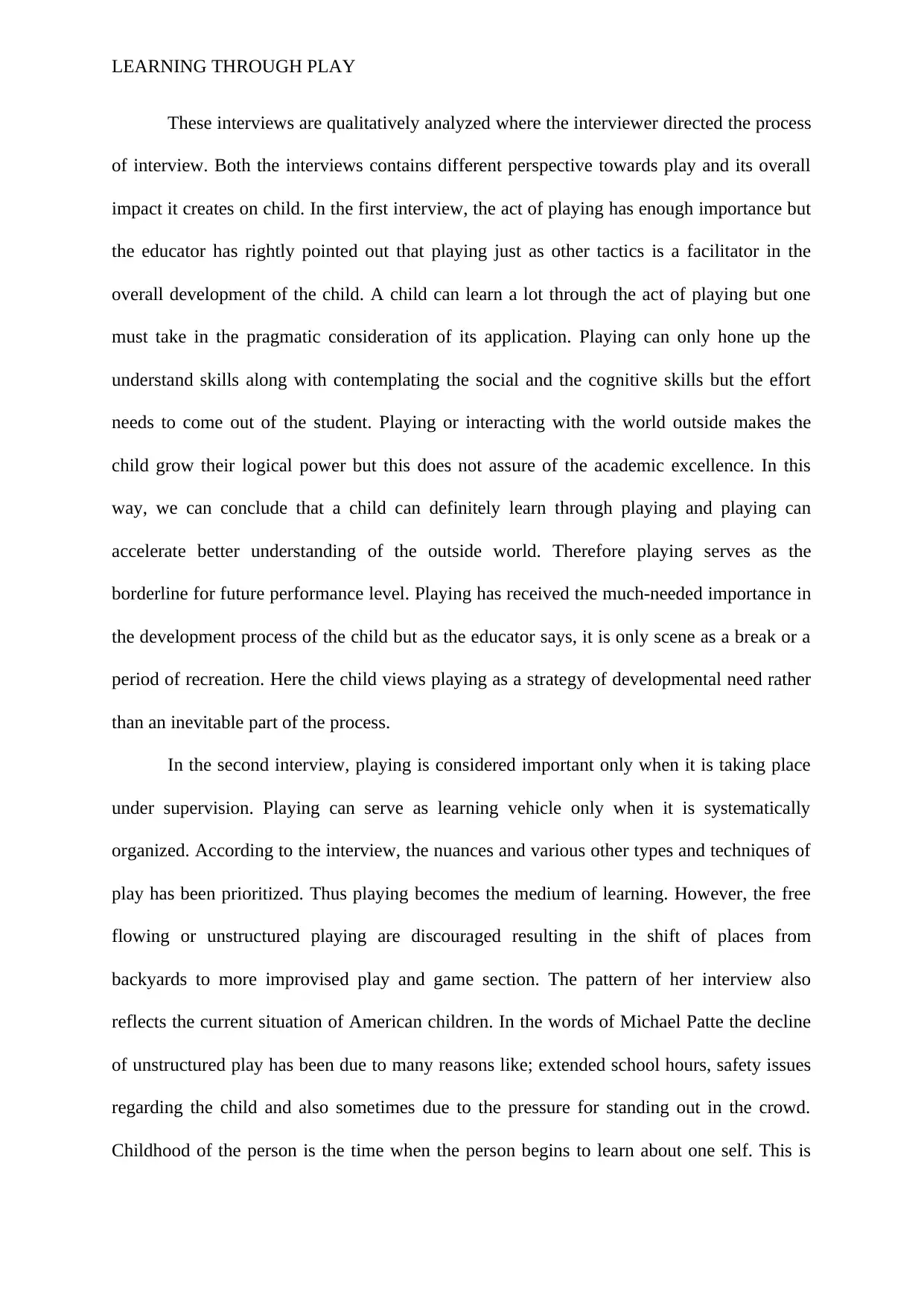
LEARNING THROUGH PLAY
These interviews are qualitatively analyzed where the interviewer directed the process
of interview. Both the interviews contains different perspective towards play and its overall
impact it creates on child. In the first interview, the act of playing has enough importance but
the educator has rightly pointed out that playing just as other tactics is a facilitator in the
overall development of the child. A child can learn a lot through the act of playing but one
must take in the pragmatic consideration of its application. Playing can only hone up the
understand skills along with contemplating the social and the cognitive skills but the effort
needs to come out of the student. Playing or interacting with the world outside makes the
child grow their logical power but this does not assure of the academic excellence. In this
way, we can conclude that a child can definitely learn through playing and playing can
accelerate better understanding of the outside world. Therefore playing serves as the
borderline for future performance level. Playing has received the much-needed importance in
the development process of the child but as the educator says, it is only scene as a break or a
period of recreation. Here the child views playing as a strategy of developmental need rather
than an inevitable part of the process.
In the second interview, playing is considered important only when it is taking place
under supervision. Playing can serve as learning vehicle only when it is systematically
organized. According to the interview, the nuances and various other types and techniques of
play has been prioritized. Thus playing becomes the medium of learning. However, the free
flowing or unstructured playing are discouraged resulting in the shift of places from
backyards to more improvised play and game section. The pattern of her interview also
reflects the current situation of American children. In the words of Michael Patte the decline
of unstructured play has been due to many reasons like; extended school hours, safety issues
regarding the child and also sometimes due to the pressure for standing out in the crowd.
Childhood of the person is the time when the person begins to learn about one self. This is
These interviews are qualitatively analyzed where the interviewer directed the process
of interview. Both the interviews contains different perspective towards play and its overall
impact it creates on child. In the first interview, the act of playing has enough importance but
the educator has rightly pointed out that playing just as other tactics is a facilitator in the
overall development of the child. A child can learn a lot through the act of playing but one
must take in the pragmatic consideration of its application. Playing can only hone up the
understand skills along with contemplating the social and the cognitive skills but the effort
needs to come out of the student. Playing or interacting with the world outside makes the
child grow their logical power but this does not assure of the academic excellence. In this
way, we can conclude that a child can definitely learn through playing and playing can
accelerate better understanding of the outside world. Therefore playing serves as the
borderline for future performance level. Playing has received the much-needed importance in
the development process of the child but as the educator says, it is only scene as a break or a
period of recreation. Here the child views playing as a strategy of developmental need rather
than an inevitable part of the process.
In the second interview, playing is considered important only when it is taking place
under supervision. Playing can serve as learning vehicle only when it is systematically
organized. According to the interview, the nuances and various other types and techniques of
play has been prioritized. Thus playing becomes the medium of learning. However, the free
flowing or unstructured playing are discouraged resulting in the shift of places from
backyards to more improvised play and game section. The pattern of her interview also
reflects the current situation of American children. In the words of Michael Patte the decline
of unstructured play has been due to many reasons like; extended school hours, safety issues
regarding the child and also sometimes due to the pressure for standing out in the crowd.
Childhood of the person is the time when the person begins to learn about one self. This is
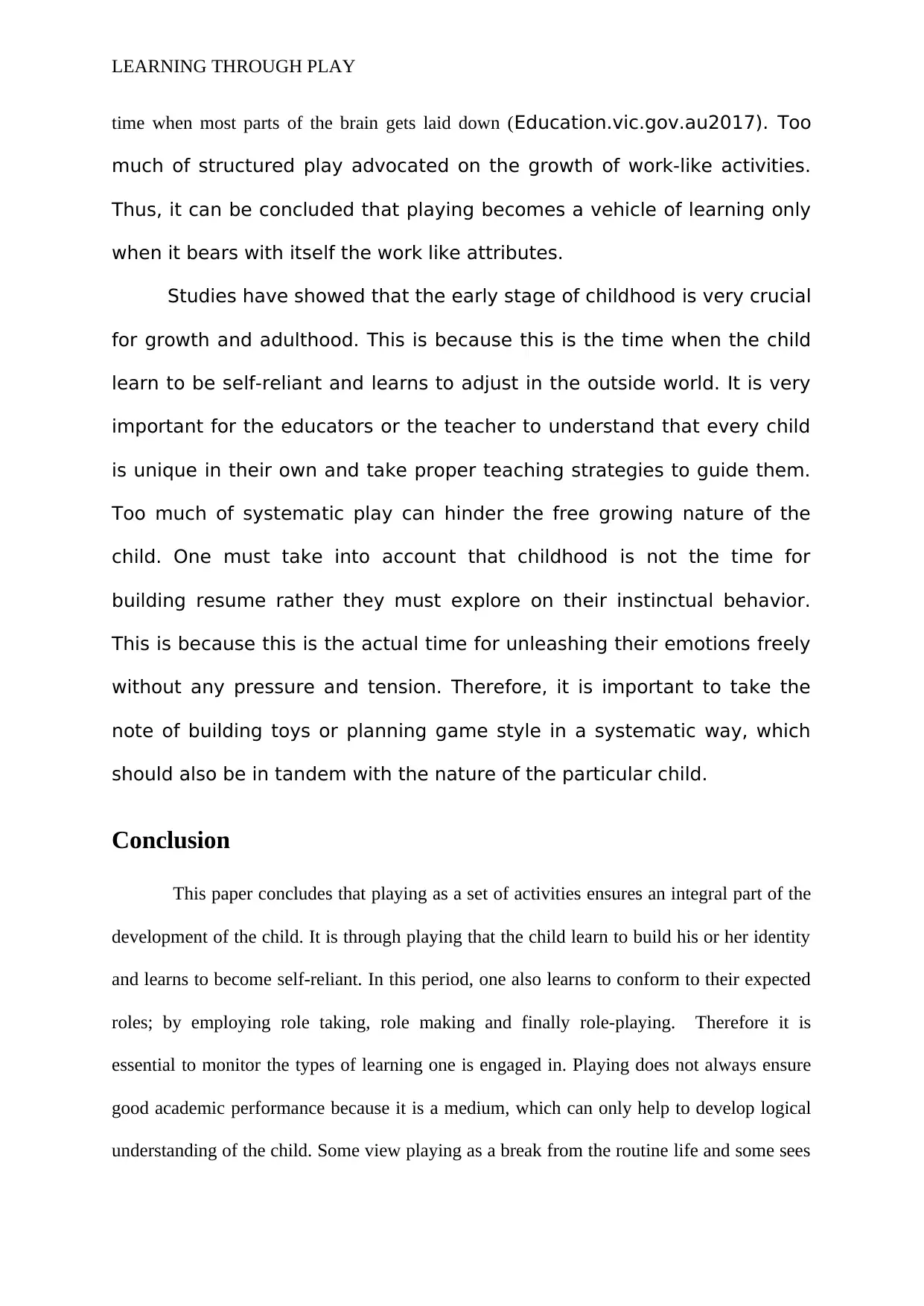
LEARNING THROUGH PLAY
time when most parts of the brain gets laid down (Education.vic.gov.au2017). Too
much of structured play advocated on the growth of work-like activities.
Thus, it can be concluded that playing becomes a vehicle of learning only
when it bears with itself the work like attributes.
Studies have showed that the early stage of childhood is very crucial
for growth and adulthood. This is because this is the time when the child
learn to be self-reliant and learns to adjust in the outside world. It is very
important for the educators or the teacher to understand that every child
is unique in their own and take proper teaching strategies to guide them.
Too much of systematic play can hinder the free growing nature of the
child. One must take into account that childhood is not the time for
building resume rather they must explore on their instinctual behavior.
This is because this is the actual time for unleashing their emotions freely
without any pressure and tension. Therefore, it is important to take the
note of building toys or planning game style in a systematic way, which
should also be in tandem with the nature of the particular child.
Conclusion
This paper concludes that playing as a set of activities ensures an integral part of the
development of the child. It is through playing that the child learn to build his or her identity
and learns to become self-reliant. In this period, one also learns to conform to their expected
roles; by employing role taking, role making and finally role-playing. Therefore it is
essential to monitor the types of learning one is engaged in. Playing does not always ensure
good academic performance because it is a medium, which can only help to develop logical
understanding of the child. Some view playing as a break from the routine life and some sees
time when most parts of the brain gets laid down (Education.vic.gov.au2017). Too
much of structured play advocated on the growth of work-like activities.
Thus, it can be concluded that playing becomes a vehicle of learning only
when it bears with itself the work like attributes.
Studies have showed that the early stage of childhood is very crucial
for growth and adulthood. This is because this is the time when the child
learn to be self-reliant and learns to adjust in the outside world. It is very
important for the educators or the teacher to understand that every child
is unique in their own and take proper teaching strategies to guide them.
Too much of systematic play can hinder the free growing nature of the
child. One must take into account that childhood is not the time for
building resume rather they must explore on their instinctual behavior.
This is because this is the actual time for unleashing their emotions freely
without any pressure and tension. Therefore, it is important to take the
note of building toys or planning game style in a systematic way, which
should also be in tandem with the nature of the particular child.
Conclusion
This paper concludes that playing as a set of activities ensures an integral part of the
development of the child. It is through playing that the child learn to build his or her identity
and learns to become self-reliant. In this period, one also learns to conform to their expected
roles; by employing role taking, role making and finally role-playing. Therefore it is
essential to monitor the types of learning one is engaged in. Playing does not always ensure
good academic performance because it is a medium, which can only help to develop logical
understanding of the child. Some view playing as a break from the routine life and some sees
⊘ This is a preview!⊘
Do you want full access?
Subscribe today to unlock all pages.

Trusted by 1+ million students worldwide
1 out of 18
Related Documents
Your All-in-One AI-Powered Toolkit for Academic Success.
+13062052269
info@desklib.com
Available 24*7 on WhatsApp / Email
![[object Object]](/_next/static/media/star-bottom.7253800d.svg)
Unlock your academic potential
Copyright © 2020–2026 A2Z Services. All Rights Reserved. Developed and managed by ZUCOL.





